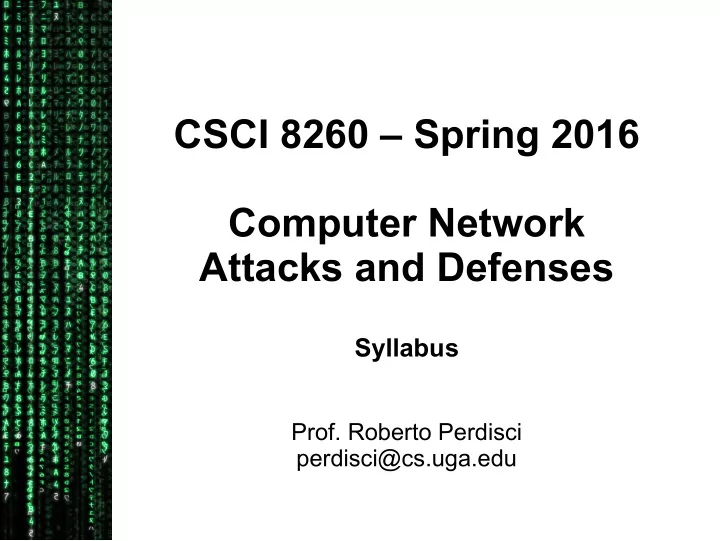

CSCI 8260 – Spring 2016 Computer Network Attacks and Defenses Syllabus Prof. Roberto Perdisci perdisci@cs.uga.edu
Who is this course for? l Open to graduate students only l Students who complete this course successfully will receive 8000-level credit (4 credit hours) l This is an advanced, research-oriented course l Prerequisites l Operating Systems l Computer Networks l Programming (e.g., C/C++, Java, Python) l Basics of Computer Security + Crypto will help!
Goals of this course l Analyze computer security systems l Learn to identify vulnerabilities l Analyze recent attacks l Learn to design better defenses l Find and address open research problems l Learn to read, analyze, and write academic papers
How will we get there? l Brief introduction to security concepts l Quick intro to ML concepts (later in the course) l Seminar-style lectures l We'll read papers (mainly) from top security and systems conferences IEEE S&P, USENIX Security, ACM CCS, NDSS, SIGCOMM, NSDI, l etc... l Papers will be assigned in advance l Students are responsible for l Presenting one or more papers during the semester l Writing short reviews for some of the papers l Reading all assigned papers!
Topics l Malware: analysis, packing/obfuscation, detection, behavioral clustering l Worms: propagation and mitigation l Botnets: measurement and detection l Spam: content analysis, network-level spammer behavior l Vulnerabilities: Buffer-overflows, return- oriented programming l IDS: Anomaly detectors, evasion attacks
Topics l Web Security: browser-side and server-side vulnerabilities l Privacy: de-anonymizing data, self-destructive data l DNS security: poisoning attacks, domain reputation and blacklisting l Physical security: hardware-assisted security primitives, audio-visual attacks
Grading l 10% Class Participation l 15% Paper Reviews l 35% Paper Presentations l 40% Research Project
Class Participation (10%) l We will discuss one paper per lecture (refer to course schedule) l You will need to read all papers , unless I indicated a paper is "optional" l Reading the papers is fundamental to be able to actively participate to discussions during class
Paper Reviews (15%) l You are responsible to write a short peer-style review for some of the papers (one paper per week, in average) l I will indicate what papers you need to review l Reviews need to be short (max 1 or 2 pages) and yet meaningful What is the paper about? l What are the main contributions? l Are the contributions novel or incremental? l Is the paper technically correct l Is the experimental setup realistic? l What are the main experimental results? l Are they over-optimistic? Are they satisfying? l Pros/Cons and open problems l
Paper Presentations (35%) l You will be asked to present one or more papers during the semester l Presentation guidelines l 40-50 min presentation + 15-20 min discussion l introduce the problem l explain motivations for the work l differences with previous work l describe approach l experimental setup/results l limitations l pros/cons and points for discussion
Research Project (40%) l I will suggest possible projects, but feel free to propose your own relevant topic l Clearly state l motivation, approach, results l Choose early! l Be realistic! l Don't try to solve a Millennium Prize Problem in one semester! l I prefer simplicity+completeness to nice ideas but incomplete results l unless you really have a super cool idea that has a chance to be published in IEEE S&P!
Research Project l it does not necessarily have to be related to your long-term research plans, but... l try to find something that is close to your research area, if possible - You will likely enjoy it more! - You will probably do better! - e.g., if you do research in DBs, try to find something related to DB security - If you do research in mobile computing, choose something related to security in mobile devices - etc.
Research Project l Advice l read as many papers as you can on the topic you are interested in l make sure you are not re-inventing the wheel l can we overcome limitations of previous work? l look at the problem from a different angle l measurement papers are ok, in particular when you can draw unexpected or non- obvious conclusions
Research Project l Things to consider l data is fundamental! l what data have you got access to? l what data would you be able to get? l can you perform experiments on a meaningful amount of data? l if you have doubts l talk to me...
Academic Integrity l Every student must abide by UGA's academic honesty policy l Dishonest behavior including cheating, copying, or forging experimental results will not be tolerated!
Ethical Learning l In this class we will learn about vulnerabilities in computer systems and attacks that may exploit them l Such information must never be used for unethical purposes
First Assignment l Learn LaTeX, please! http://en.wikibooks.org/wiki/LaTeX and plenty of other tutorials online...
Logistics l Course website l http://www.cs.uga.edu/~perdisci/CSCI8260-S16/ l official reference for all details regarding the course (check it regularly!) l You can email me for questions l perdisci@cs.uga.edu l please use [CSCI8260] in the subject! l If you need to talk to me l right after class l office hours (to be announced)
Next l Introduction to Computer Security l Brief overview of research topics in security l Intro to ML l Tips on how to choose a research project l Tips on how to write a paper (maybe later in the course … ) l Start choosing what papers you would like to present (I will make a list available soon)
Before you leave... l Questions? l Introduce yourself and your research interests!
Recommend
More recommend